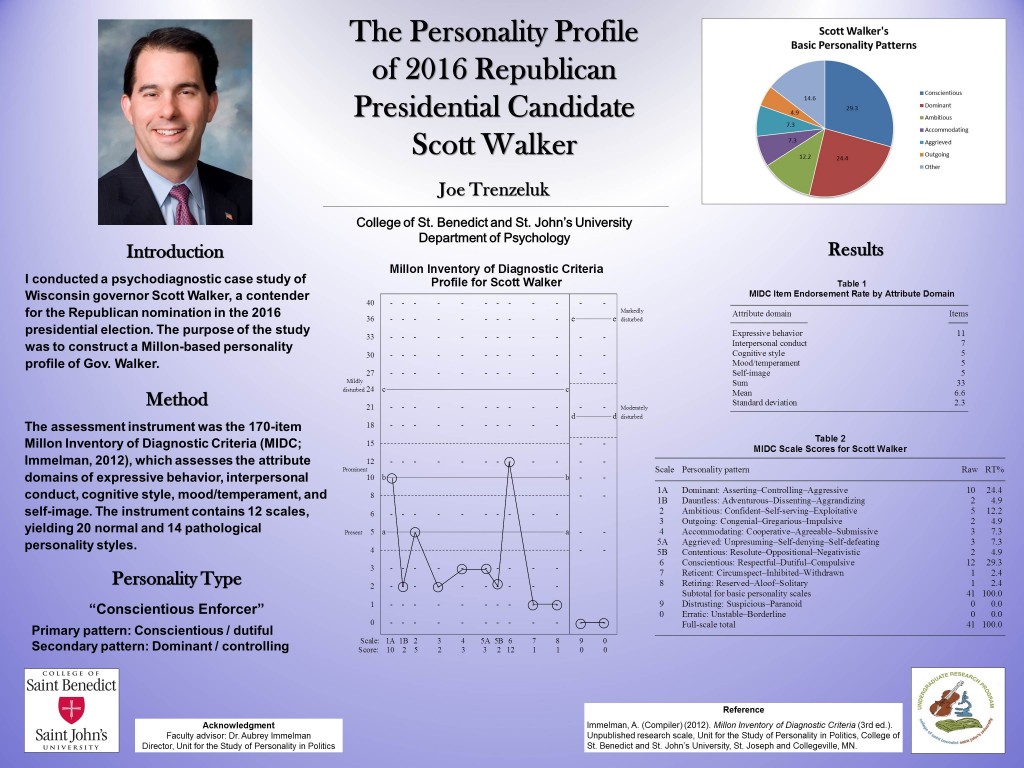Featured Posts

- Index of Psychological Studies of Presidents and Other Leaders Conducted at the Unit for the Study of Personality in Politics
- The Personality Profile of U.S. Supreme Court Associate Justice Brett Kavanaugh
- The Leadership Style of North Korean Leader Kim Jong-un
- North Korea Threat Assessment: The Psychological Profile of Kim Jong-un
- Russia Threat Assessment: Psychological Profile of Vladimir Putin
- The Personality Profile of 2016 Republican Presidential Candidate Donald Trump
- Donald Trump's Narcissism Is Not the Main Issue
- New Website on the Psychology of Politics
- Unit for the Study of Personality in Politics --- 'Media Tipsheet'
categories

- Afghanistan (228)
- Al Gore (2)
- Amy Klobuchar (4)
- Ayman al-Zawahiri (7)
- Barack Obama (60)
- Ben Carson (2)
- Bernie Sanders (7)
- Beto O'Rourke (3)
- Bill Clinton (4)
- Bob Dole (2)
- Campaign log (109)
- Chris Christie (2)
- Chuck Hagel (7)
- Criminal profiles (8)
- Dick Cheney (11)
- Domestic resistance movements (21)
- Donald Trump (31)
- Economy (33)
- Elizabeth Warren (4)
- Environment (24)
- George H. W. Bush (1)
- George W. Bush (21)
- Hillary Clinton (9)
- Immigration (39)
- Iran (43)
- Iraq (258)
- Jeb Bush (3)
- Joe Biden (13)
- John Edwards (2)
- John Kasich (2)
- John Kerry (1)
- John McCain (7)
- Kamala Harris (5)
- Kim Jong-il (3)
- Kim Jong-un (11)
- Law enforcement (25)
- Libya (18)
- Mahmoud Ahmadinejad (6)
- Marco Rubio (2)
- Michael Bloomberg (1)
- Michele Bachmann (173)
- Mike Pence (3)
- Military casualties (234)
- Missing person cases (37)
- Mitt Romney (13)
- Muqtada al-Sadr (10)
- Muslim Brotherhood (6)
- National security (16)
- Nelson Mandela (4)
- News (5)
- North Korea (36)
- Osama bin Laden (19)
- Pakistan (49)
- Personal log (25)
- Pete Buttigieg (4)
- Presidential candidates (19)
- Religious persecution (11)
- Rick Perry (3)
- Rick Santorum (2)
- Robert Mugabe (2)
- Rudy Giuliani (4)
- Russia (7)
- Sarah Palin (7)
- Scott Walker (2)
- Somalia (20)
- Supreme Court (4)
- Syria (5)
- Ted Cruz (4)
- Terrorism (65)
- Tim Pawlenty (8)
- Tom Horner (14)
- Tributes (40)
- Uncategorized (50)
- Vladimir Putin (4)
- Xi Jinping (2)
- Yemen (24)
Links

archives

- November 2021
- January 2021
- November 2020
- October 2020
- September 2020
- August 2020
- July 2020
- April 2020
- March 2020
- February 2020
- January 2020
- December 2019
- October 2019
- July 2019
- May 2019
- April 2019
- March 2019
- February 2019
- January 2019
- December 2018
- September 2018
- August 2018
- July 2018
- June 2018
- April 2018
- March 2018
- February 2018
- January 2018
- August 2017
- July 2017
- June 2017
- May 2017
- April 2017
- February 2017
- January 2017
- December 2016
- November 2016
- October 2016
- September 2016
- August 2016
- July 2016
- June 2016
- May 2016
- April 2016
- March 2016
- February 2016
- January 2016
- December 2015
- November 2015
- October 2015
- September 2015
- August 2015
- July 2015
- June 2015
- May 2015
- April 2015
- March 2015
- February 2015
- January 2015
- December 2014
- November 2014
- October 2014
- September 2014
- August 2014
- July 2014
- June 2014
- May 2014
- April 2014
- March 2014
- February 2014
- January 2014
- December 2013
- November 2013
- October 2013
- September 2013
- August 2013
- July 2013
- June 2013
- May 2013
- April 2013
- March 2013
- February 2013
- January 2013
- December 2012
- November 2012
- October 2012
- September 2012
- August 2012
- July 2012
- June 2012
- May 2012
- April 2012
- March 2012
- February 2012
- January 2012
- December 2011
- November 2011
- October 2011
- September 2011
- August 2011
- July 2011
- June 2011
- May 2011
- April 2011
- March 2011
- February 2011
- January 2011
- December 2010
- November 2010
- October 2010
- September 2010
- August 2010
- July 2010
- June 2010
- May 2010
- April 2010
- March 2010
- February 2010
- January 2010
- December 2009
- November 2009
- October 2009
- September 2009
- August 2009
- July 2009
- June 2009
- May 2009
- April 2009
- March 2009
- February 2009
- January 2009
- December 2008
- November 2008
- October 2008
- September 2008
- August 2008
- July 2008
meta

A psychological analysis of Wisconsin governor Scott Walker — a contender for the Republican nomination in the 2016 presidential election — by Joe Trenzeluk and Aubrey Immelman, Ph.D., at the Unit for the Study of Personality in Politics, revealed that Walker’s predominant personality pattern is Conscientious/dutiful and Dominant/controlling, with secondary Ambitious/confident features. In summary, Walker’s personality composite can be characterized as a conscientious enforcer.

Click on image for larger view
Following is a summary of the major findings of the study, as published in an opinion column in the St. Cloud Times.
————————————————————————————————
What Does Personality Analysis Say About Walker?

Wisconsin Gov. Scott Walker addresses employees and members of the media July 12 at Valveworks USA prior to signing the state’s 2015-2017 budget on the production floor of the Waukesha, Wis., company. (Photo: John Hart / Wisconsin State Journal via AP)
By Joe Trenzeluk
St. Cloud Times
July 26, 2015
Wisconsin Gov. Scott Walker earlier this month formally threw his hat in the ring as a Republican candidate in the 2016 presidential election. It came as no surprise that Walker entered the race; he had been signaling his intent for months and recent polls have consistently ranked him in the top tier of the crowded Republican field.
The unprecedented multitude of Republican hopefuls makes it more challenging than ever to evaluate the candidates and distinguish them from one another. Ultimately, 16 declared candidates are expected to be in the mix when the first Republican debate takes place Aug. 6 in Cleveland.
Because all of the candidates share a common party-political platform, their policy differences for the most part are on the margins. For that reason, a good point of departure in evaluating the relative merits of the candidates is to look beyond their policy positions and see what kind of person each candidate is, at base.
Identifying the personality characteristics of political leaders matters because personality captures the stable, enduring patterns in a person’s motives, thoughts and actions over time and across situations. Thus, accurate personality assessment allows us to anticipate a leader’s response to a broad range of contingencies that could confront them in office.
Empirical analysis of Walker’s personality at the College of St. Benedict and St. John’s University’s Unit for the Study of Personality in Politics utilized the 170-item Millon Inventory of Diagnostic Criteria, which assesses the attribute domains of expressive behavior, interpersonal conduct, cognitive style, mood/temperament and self-image.
Conscientious enforcer
Walker’s primary personality pattern was found to be dominant/controlling, with secondary features of the conscientious/dutiful and ambitious/confident patterns.
The combination of dominant and conscientious patterns in Walker’s profile suggests a personality composite best described as a conscientious enforcer. By virtue of their high conscientiousness, this type of individual typically is earnest, deliberative, hard-working, principled and bound by rules and a sense of duty. They are often religious and place a great deal of importance on maintaining their integrity and upholding moral standards.
The dominant, “enforcer†aspect of this personality composite suggests an individual who is strong-willed, commanding and assertive. This dominance, complemented by substantial self-confidence (as in the case of Walker), also points to an individual with a competitive, goal-oriented drive to succeed.
Leadership implications
News reports commonly portray Walker as a “low-key Midwesterner†or a “somewhat bland, boring, and uncharismatic persona.†To some degree, these assertions fit with his personality profile in that conscientious individuals tend to have a serious, emotionally controlled demeanor; in short, Walker’s polite, respectful manner may at times come across as somewhat awkward and rigid.
Walker’s particular personality pattern has important leadership implications. Conscientious enforcers like Walker have the work ethic, managerial competence and drive to push tirelessly — even obstinately — for new initiatives, reform and policy implementation.
Overall, Walker has a personality well suited for high-level, high-stakes politics. However, on a personal level, the big test for the Walker campaign will be the candidate’s ability to restrain — or transcend — the more restrictive, buttoned-down aspects of his conscientious nature and allow more personable, easygoing qualities to shine through.
Unless he succeeds in engaging, energizing and inspiring voters at a more personal level, it will be difficult for Walker to separate himself from the crowded Republican field.
This is the opinion of Joe Trenzeluk, Inver Grove Heights, a senior psychology major at the College of St. Benedict and St. John’s University, where he is a summer research fellow in the Unit for the Study of Personality in Politics, directed by Aubrey Immelman.

Joe Trenzeluk, Inver Grove Heights (Submitted photo)
About this series
This is the first in an occasional series of personality profiles of most of the Republican candidates in the 2016 presidential election. Joe Trenzeluk is a research assistant at the Unit for the Study of Personality in Politics led by associate professor Aubrey Immelman at St. John’s University/College of St. Benedict. Immelman specializes in the psychological assessment of presidential candidates and world leaders.
The unit’s summer research program focused on GOP contenders because of the unprecedented proliferation of hopefuls and the unit’s mission to help the public make better informed voting choices. The unit will profile the major Democratic contenders next summer.
———————————
8/6/2015 Update

Joe Trenzeluk presents his summer research on the political personality of presidential candidate Scott Walker at the Undergraduate Research Poster Session, College of St. Benedict, St. Joseph, Minn, Aug. 5, 2015. (Photo: Pam Bacon)
———————————————————————————————————
Note: Personal Electability Index (political impact) score
Scott Walker scores relatively low on the Millon Inventory of Diagnostic Criteria-based Personal Electability Index, which has accurately predicted the outcome of every presidential election since 1996.
Following are the PEI calculations for Scott Walker:
Scott Walker: PEI = 8
Scale:Â 1AÂ Â 1BÂ Â 2Â 3Â Â 4Â Â 5AÂ Â 5BÂ Â 6Â Â 7Â Â 8
Score:Â 10 Â Â 2 Â Â 5Â 2 Â 3 Â Â Â 3 Â Â Â 2Â 12Â Â 1Â Â 1
Scale: 1A = 10; 2 = 5; 3 = 2; 6 = 12; 8 = 1
[Extraversion (scale 3) = 2] + [Narcissism (scale 2) = 5] + [Dominance (scale 1) = 10] – [Introversion (scale 8) = 1] – [Conscientiousness (scale 6) = (12 – 4) = 8] = 17 – 9 = 8
————————————————
Related report on this site
Republican Presidential Candidate Profiles, Polling, and Debates (May 31, 2015)
Leave a Reply
You must be logged in to post a comment.



July 27th, 2015 at 1:59 pm
[…] The Personality Profile of 2016 Republican Presidential Candidate Scott Walker (July 26, 2015) […]
August 1st, 2015 at 2:12 pm
[…] The Personality Profile of 2016 Republican Presidential Candidate Scott Walker (July 26, 2015) […]
August 5th, 2015 at 6:18 pm
[…] The Personality Profile of 2016 Republican Presidential Candidate Scott Walker (July 26, 2015) […]
August 8th, 2015 at 2:42 pm
[…] The Personality Profile of 2016 Republican Presidential Candidate Scott Walker (July 26, 2015) […]
August 14th, 2015 at 11:41 am
[…] Scott Walker –Â preliminary study [Update: study completed July 2015] […]
August 30th, 2015 at 9:57 am
[…] The Personality Profile of 2016 Republican Presidential Candidate Scott Walker (July 26, 2015) […]
March 3rd, 2016 at 8:16 am
[…] Scott Walker (PEI = 8) […]
March 24th, 2016 at 5:06 pm
[…] The Personality Profile of 2016 Republican Presidential Candidate Scott Walker (July 26, 2015) […]
July 1st, 2019 at 7:53 pm
[…] The Personality Profile of 2016 Republican Presidential Candidate Scott Walker (PEI = 8) […]